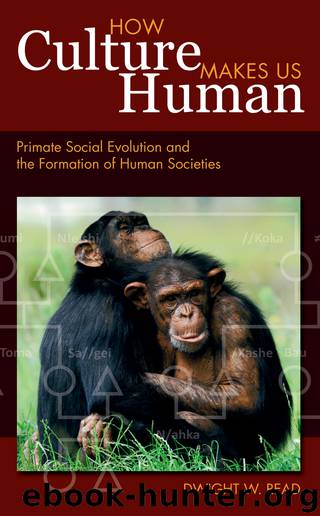How Culture Makes Us Human: Primate Social Evolution and the Formation of Human Societies by Read Dwight W

Author:Read, Dwight W [Dwight W. Read]
Language: eng
Format: epub
ISBN: 9781315427232
Publisher: Taylor & Francis Ltd
(2) Transition Through Loss of Dominance Hierarchies and Normative Behavior
An alternative pathway to human social systems exemplified by hunter-gatherer societies has been developed recently by Benoît Dubreuil (2010). Dubreuil’s pathway also involves two steps: first, the loss of dominance hierarchies as the basis of social structure and second, neurological changes through encephalization that enabled norm-based behavior and social cooperation in areas of mating and reproduction. The loss of a dominance hierarchy is said to be triggered by the development of cooperative feeding by our ancestral hominin species, Homo erectus, and so dates back to around 1.5 million years BP. This trend, he argues, was enhanced through the introduction of cooperative breeding in which a biological mother received parenting assistance from other group members. Cooperative breeding then purportedly arose along with more pronounced encephalization in our ancestral lineage during the Middle Pleistocene, around 500,000 years BP, and is associated with our ancestral forms classified as Homo heidelbergensis. Dubreuil rejects Chapais’s second step of a shift to pair-bonding through weapons making it possible to kill competitor males at little cost as it would require, he argues, just the right balance of lethality for pair-bonding to be a stable equilibrium arising from the development of weapons. If a male could easily kill any competitor, he argues, then it would be in his interest to kill all competitors, and the only stable solution would be a single male mating with all females; that is, there would be a shift to a large-scale, harem system without male competitors. If the cost was too high, the shift would only be to a reduced harem system, not to monogamous pair-bonding.
For the first step, Dubreuil draws upon the argument made by Christopher Boehm (1999) regarding the egalitarian character of hunter-gather and nomadic tribal societies discussed in chapter 3. According to Boehm, the egalitarian character derives from an egalitarian ethos that reverses a natural tendency to dominate other individuals. Boehm centers his argument on ethnographic evidence showing that when an individual in a hunter-gatherer society attempts to parlay his particular skills, such as being an excellent hunter, into a dominance relation visa-vis other males, he is countered with active resistance on their part. Their resistance can vary from ridicule or gossip, to social ostracization, and to killing in extreme cases. Other males are acting, he argues, according to an ethos of equality among males that essentially denies to any individual the right to dominate others or to expect subservience from them. Another way to phrase it would be to say that dominance can arise when a male recognizes himself as an individual who can express his individualistic behavior in the manner he sees fit and acts according to his capabilities. However, a stable dominance hierarchy, by its very nature, is based on the willingness or predisposition of individuals to act, instead, according to their position in the dominance hierarchy.
For the OW monkeys, the assertion that the behaviors leading to a stable dominance hierarchy arose through biological kin selection implies
Download
This site does not store any files on its server. We only index and link to content provided by other sites. Please contact the content providers to delete copyright contents if any and email us, we'll remove relevant links or contents immediately.
| Anthropology | Archaeology |
| Philosophy | Politics & Government |
| Social Sciences | Sociology |
| Women's Studies |
Born to Run: by Christopher McDougall(7127)
The Leavers by Lisa Ko(6948)
iGen by Jean M. Twenge(5416)
Sapiens by Yuval Noah Harari(5372)
Spare by Prince Harry The Duke of Sussex(5197)
The Kite Runner by Khaled Hosseini(5180)
Machine Learning at Scale with H2O by Gregory Keys | David Whiting(4313)
Bullshit Jobs by David Graeber(4190)
Never by Ken Follett(3957)
Goodbye Paradise(3810)
Livewired by David Eagleman(3775)
Fairy Tale by Stephen King(3399)
A Dictionary of Sociology by Unknown(3085)
Harry Potter 4 - Harry Potter and The Goblet of Fire by J.K.Rowling(3074)
The Social Psychology of Inequality by Unknown(3031)
The Club by A.L. Brooks(2925)
Will by Will Smith(2920)
0041152001443424520 .pdf by Unknown(2846)
People of the Earth: An Introduction to World Prehistory by Dr. Brian Fagan & Nadia Durrani(2738)
